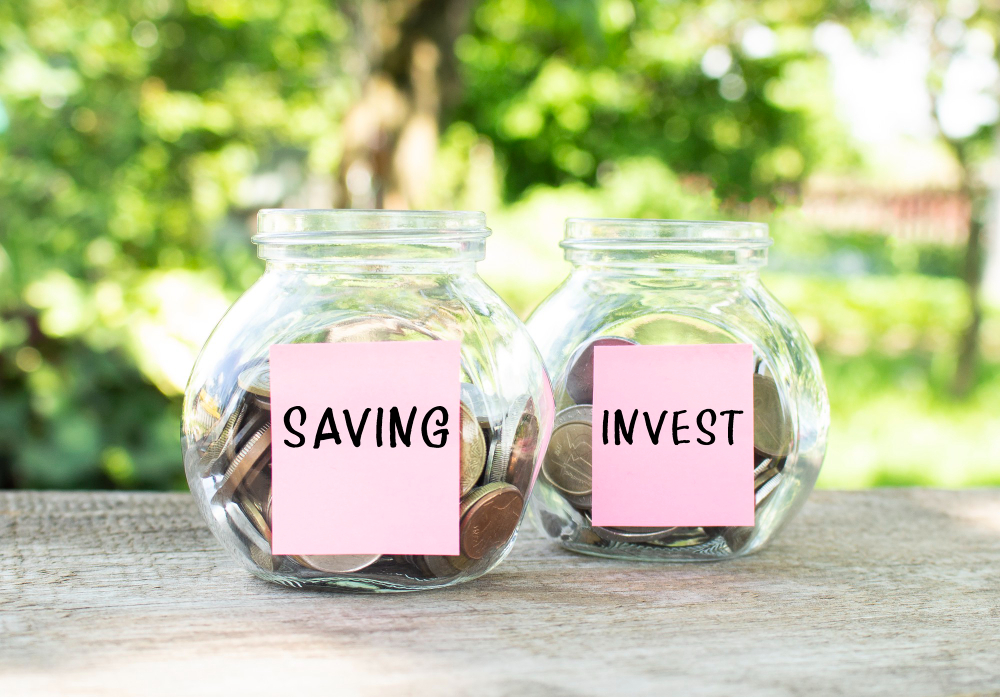
Saving and Investing Both Matter—But for Different Reasons
You’ve probably heard conflicting advice about money. Some say, “Save every penny!” Others insist, “Invest or you’ll never build wealth!” So which one is right?
The truth is, both saving and investing are important, but they serve different purposes. The key is knowing when to save when to invest, and how to balance both. If you get it wrong, you might either miss out on financial growth or leave yourself unprepared for unexpected expenses.
Let’s break it down in simple terms.
Saving vs. Investing: What’s the Difference?

Saving = Keeping money in a safe place for short-term needs.
Low risk, low reward.
Investing = Using money to grow wealth over time.
Higher risk, higher potential reward.
The main difference?
Savings are for things you’ll need soon.
Investments are for things you’ll need later.
Think of it like this:
Saving is like keeping money in your pocket—it’s accessible when you need it, but it won’t grow much.
Investing is like planting a tree—it takes time but can grow into something much bigger.
When Should You Save?

Saving is about security and flexibility. It’s money you might need at any time, so it should be easily accessible and risk-free.
Save when:
- You need an emergency fund (3–6 months of expenses).
- You’re saving for a short-term goal (vacation, car, wedding, down payment, etc.).
- You want quick access to money without worrying about market fluctuations.
Where to keep savings:
- High-yield savings accounts – Better than regular accounts but still low interest.
- Money market accounts – Similar to savings accounts but may have slightly higher returns.
- CDs (Certificates of Deposit) or FDs (Fixed Deposit)– Lock in money for a set period with a guaranteed interest rate.
Rule of thumb: If you’ll need the money in the next 1–3 years, it belongs in savings, not investments.
When Should You Invest?

Investing is about growing your money over time. It involves risk, but it’s one of the best ways to build long-term wealth and beat inflation.
Invest when:
- Your emergency fund is covered, and you can afford to leave money untouched for 5+ years.
- You want to grow your wealth for long-term goals (retirement, buying property, financial independence).
- You’re comfortable with some risk in exchange for higher potential returns.
Where to invest:
- Stocks – Higher risk, but higher long-term returns.
- Index funds/ETFs – Good for beginners; lower risk than individual stocks.
- Bonds – Lower risk, but lower returns; good for balancing investments.
- Retirement accounts (401(k), Pension Plans) – Tax advantages for long-term growth.
Rule of thumb: If you don’t need the money for at least 5 years, investing is a better option than keeping it in savings.
Common Mistakes People Make

- Saving too much, investing too little: Keeping too much money in savings loses value over time due to inflation.
- Investing before saving: If you invest without an emergency fund, you might have to sell investments at a bad time when unexpected expenses come up.
- Being afraid to invest at all: Many people avoid investing completely because it seems risky or complicated, missing out on long-term financial growth.
- Going all-in on risky investments: Investing is great, but putting everything into crypto, meme stocks, or high-risk assets can be a disaster if you don’t have a stable foundation first.
How to Balance Saving and Investing

The best approach isn’t one or the other—it’s both. Here’s how to find the right balance:
- Start with an emergency fund – Before investing, save at least 3–6 months of expenses.
- Save for short-term goals – If you need money soon, keep it in savings, not the stock market.
- Invest for the long term – Once your savings are set, start putting money into investments that can grow over time.
- There’s no perfect time – The best time to invest was yesterday. The second-best time is today. Start small and let compound growth do its thing.
In Summary: You Need Both

- Saving keeps you financially secure today. Investing builds wealth for the future.
- If you only save, your money loses value over time. If you only invest, you might struggle when unexpected expenses hit.
- The goal is to balance both so your money is working for you in the short and long term.
So, where do you stand? Are you saving too much and missing out on growth? Or investing without a safety net? A few small adjustments today can make a huge difference in your financial future.



